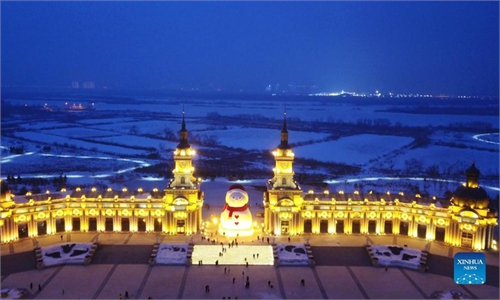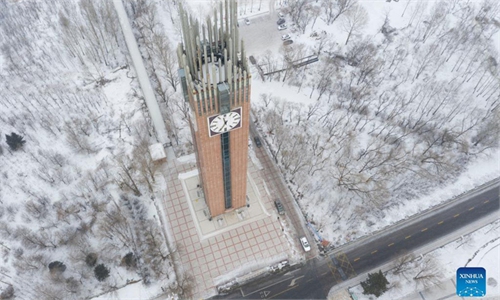Discovering Qitaihe, China's rust belt town that's become 'hometown of Winter Olympic champions'
Miners with a heart of Gold
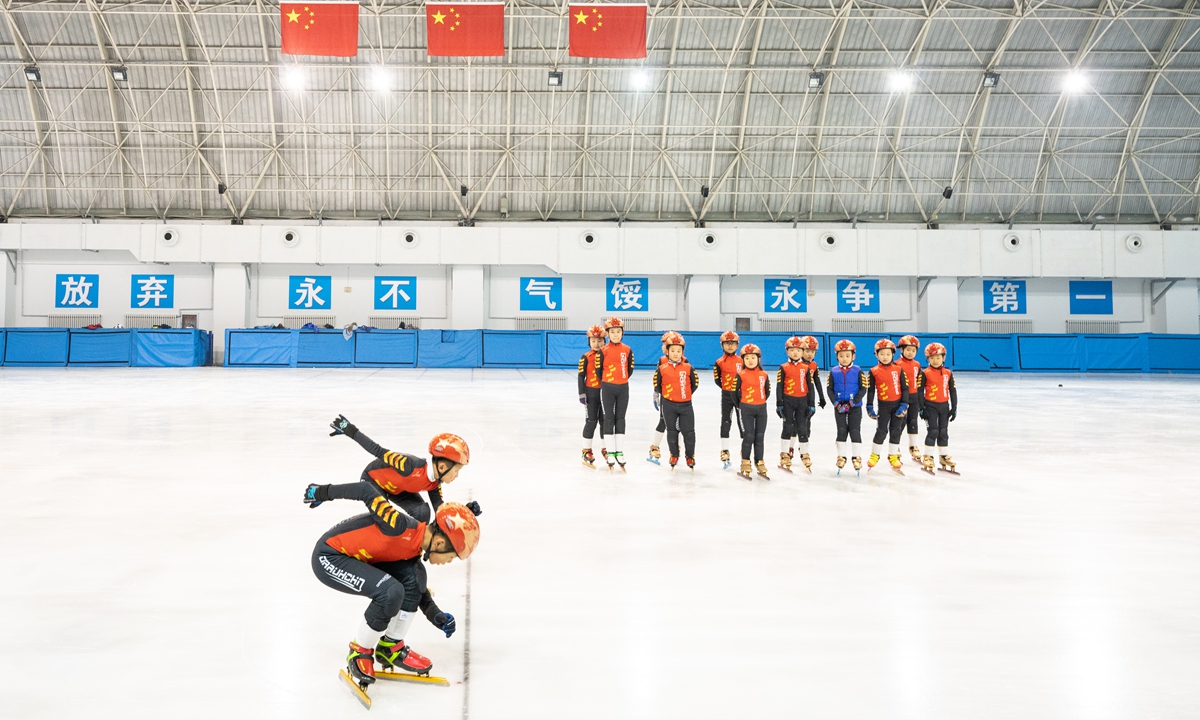
Children train at the Qitaihe Short Track Speed Skating Championship Hall on February 10, 2022. Photo:VCG
On a February night, the snowy sky was lit up by fireworks in Qitaihe, a small town in Northeast China's Heilongjiang Province, after skater, Fan Kexin, won the short track speed skating mixed-gender relay for China at the Beijing 2022 Winter Olympics.Fan is the fourth Olympic champion to hail from the small city of Qitaihe. So far, seven of China's 22 Olympic gold medals have been contributed by Qitaihe's sons and daughters, including the four-time short track speed skating Olympic champion Wang Meng and first Chinese Winter Olympic gold medalist Yang Yang.
Qitaihe used to be a city with a decades-long history of coalmining in China's rust belt. But now Qitaihe has changed its city name card from "coal black" to "icy white": A museum to the champions was built, a road has been named after Olympic champion Yang Yang, and the main road is decorated with speed skating-themed statues and street lights modeled after skaters. Even the newly built high-speed rail station is skate blade-shaped.
To many, it seems "natural" that a city with at least five months of winter is the "home of Chinese Winter Olympic champions." But more question here, Qitaihe is the smallest prefecture-level city in Heilogjiang, with a shrinking population of less than 700,000. And it wasn't until 2013 that Qitaihe got its first and only modern indoor ice rink.
Perhaps years ago, when medalists in their childhood carved their skates across the ice covered with soot and snow, they would not have believed that they would represent China at the top of the world.

External view of the Qitaihe Short Track Speed Skating Championship Hall. Photo: Wang Qi/GT
With so many cities in Northeast China, why did Qitaihe, a small city 1,600 kilometers away from Beijing, become China's cradle of winter sports champions?Digging coal on knees, skating on feet
"Our father and grandfather's generations were basically coal miners, and they taught kids that 'You have to be able to endure hardship,'" a local driver surnamed Gao said.
A Global Times reporter visited the Miners Square which opened in 2006. At the center of the square is a statue about two stories high of a miner ardently wielding a pickaxe. On the one side of the statue are the words "Kneel to dig coal, stand to be a man."
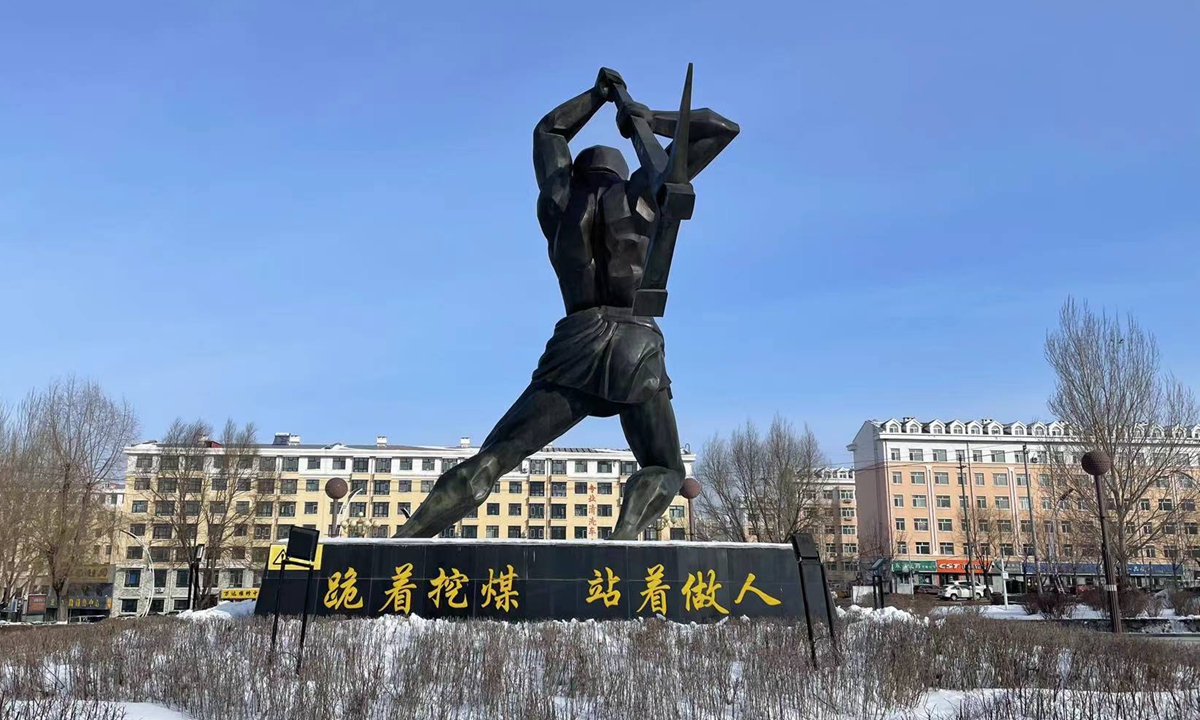
A miner's statue at Miners Square in Qitaihe. Photo: Wang Qi/GT
Gao said his father, a miner, had been working since he was 15. "He always warned me against doing illegal things, to be an indomitably upright citizen; he said you have to rely on your own strength."Gao said 80-90 percent of men in Qitaihe in their 70s had been miners, and they spent at least eight to 10 hours underground every day. In the outdoor ice rink, the reporter met a group of elderly skating enthusiasts, who are also the custodians of the ice rink. Upon inquiry, they were miners too.
"Wang Meng's father and I worked in the same mine, and I watched her grow up and she was always like a boy," a retired miner surnamed Zhu told reporters. Four years ago, Zhu and about 50 other enthusiasts swept a piece of ice over a pool of frozen water and made it an ice rink.
Fan Luhe, a 66-year-old member of the local skating association, said the rink does not charge fees and the funds to maintain it are raised by the public. He said participants include coal miners, retired officials, and students.
"The whole Qitaihe supports and loves skating. All that people care about is whose kids win the championship," a resident who was skating with her young granddaughter told the Global Times.
The brightest star
If coach Meng Qingyu were still alive, he might have been the one among the outdoor ice skaters.
In Qitaihe's new landmark, the Speed Skating Champion Exhibition Hall, are the belongings Meng Qingyu - the godfather of speed skating: Skates, stopwatches, notebooks, and others. When it opened in 2019, Meng's disciple Wang Meng donated dozens of his medals to the hall, including four Winter Olympic gold medals.
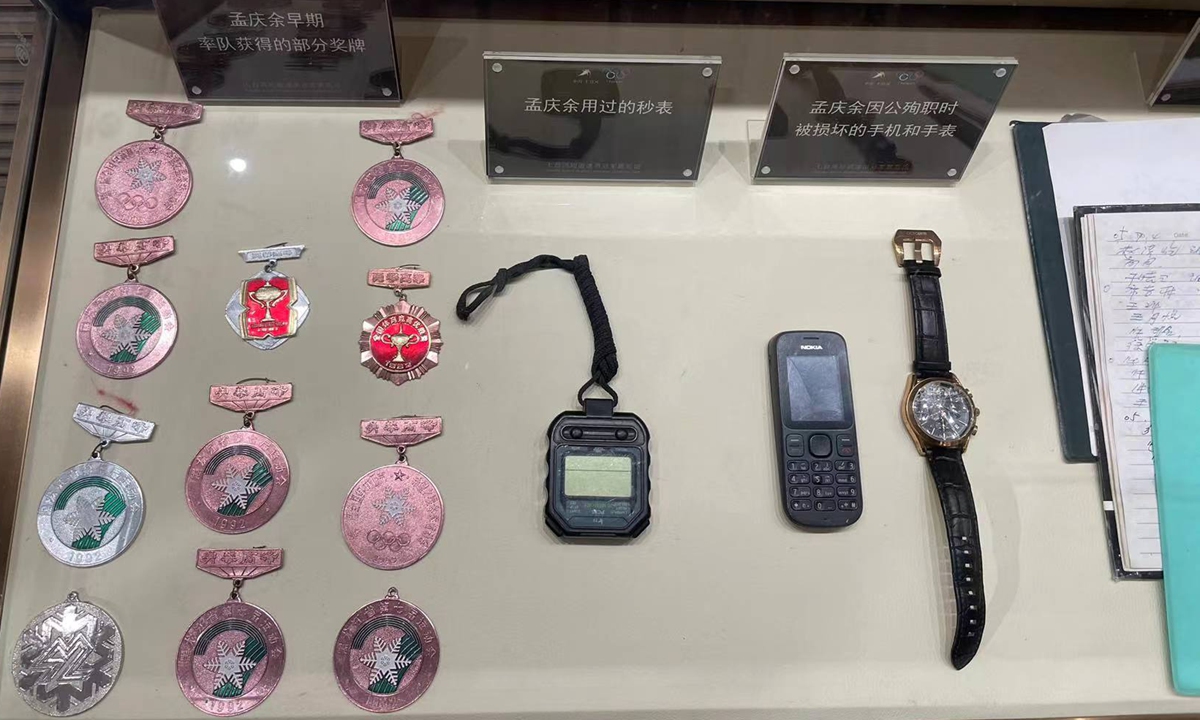
Medals, stopwatches, mobile phones, and a watch belonging to Meng Qingyu on display at Qitaihe Short Track Speed Skating Championship Hall. Photo: Wang Qi/GT
As soon as you enter the hall, you can see a "gold medal table" - 535 national gold medals, 177 world gold medals, and 10 world champions gold medals. The wall on the left side of the gate is covered with more than 1,000 pairs of skates worn by athletes, a reminder of what it takes to be a champion.Meng was born in Harbin, Heilongjiang Province, in 1951. In 1969, he was assigned to work as a coal miner in Qitaihe. In 1972, he represented Qitaihe in the skating games within the province and won three gold medals. In 1974, he was transferred to the city's sport authority and constituted a speed skating team with himself as head coach.
Meng's wife, Han Pingyun, lives alone in a government-awarded house. From a yellow and wrinkled envelope, Han pulled out a stack of pictures, mostly of Meng and his athletes, with only one family photo.
In Han's memory and that of other Qitaihe residents, Meng was such an earnest and capable man as he reprised the roles of a coach, a cook, and a doctor at the same time, as long as his athletes need him in any of these capacities. But he did not seem to be such a qualified husband or father to the family.
"My son sometimes complains about his father, who took much less care of us," Han told reporters, adding that Meng never brought gifts for her and their son when he returned home from business trips, but he always brought bags of training equipment with him.
At that time, kids in his team were all from poor families, and most of their sports equipment was handled by Meng, and a large part of his salary was spent on food. According to Han, Meng gave his team as much nutrition as possible, including eggs, beef, and fish.
Han's eyes welled up when she pointed out the photo of her 10-year-old granddaughter. In the past, the girl always asked, "Where is my grandfather when all the other kids are picked up by their grandparents?"
In August 2006, Meng died in a car accident at the age of 55. He left his family almost nothing, only tools to repair skates and a few training notes, among which were symbolic "IOUs" from his athletes.
Han said the family did not tell the girl about her grandfather's story until she was 6 years old.
"Sometimes at night she can't sleep and lies on the windowsill. When I asked her 'why don't you sleep,' my granddaughter said she's looking at the stars, as her mother told her that the brightest star is grandpa," Han said.
'It's all for free'
Zhang Jie is a disciple of Meng with a similar character and temperament. In 1991, Zhang won a gold medal in the women's 3,000-meter short track speed skating relay at the 15th World University Winter Games, becoming the first Chinese short track speed skating world champion. Her husband, Dong Yanhai, was the first coach of China's Winter Olympic champion Yang Yang and also a disciple of Meng.
The couple returned to Qitaihe in 2014, 40 years after Meng established the team here. Qitaihe, at that time, just had its first and only indoor ice rink.
After coach Meng's death, Qitaihe's short-track speed skating faced a landslide, Dong said. "From 2006 to 2013, a lot of kids were skating outdoors. It was -20 or -30 C, which was unbearable and many left the city."
Dong noted that many of the athletes moved to southern cities which could offer them better facilities and training materials. He said leaving Qitaihe at the invitation of Shanghai and Chengdu was not a difficult decision for many children.
When Qitaihe's first indoor rink opened in 2013, "there were only 17 kids and three coaches." The maintenance cost of the venue is close to 10,000 yuan a day, which is a big pressure for the city.
With the efforts from society, this problem is being solved. Qitaihe now has 11 designated schools for short track speed skating, and more than 1,300 registered skaters, ranking first among all Chinese cities.
The story of Qitaihe has given many poor children a way out, Zhang said. "Qitaihe's children are 'born to skate and train for championships.'"
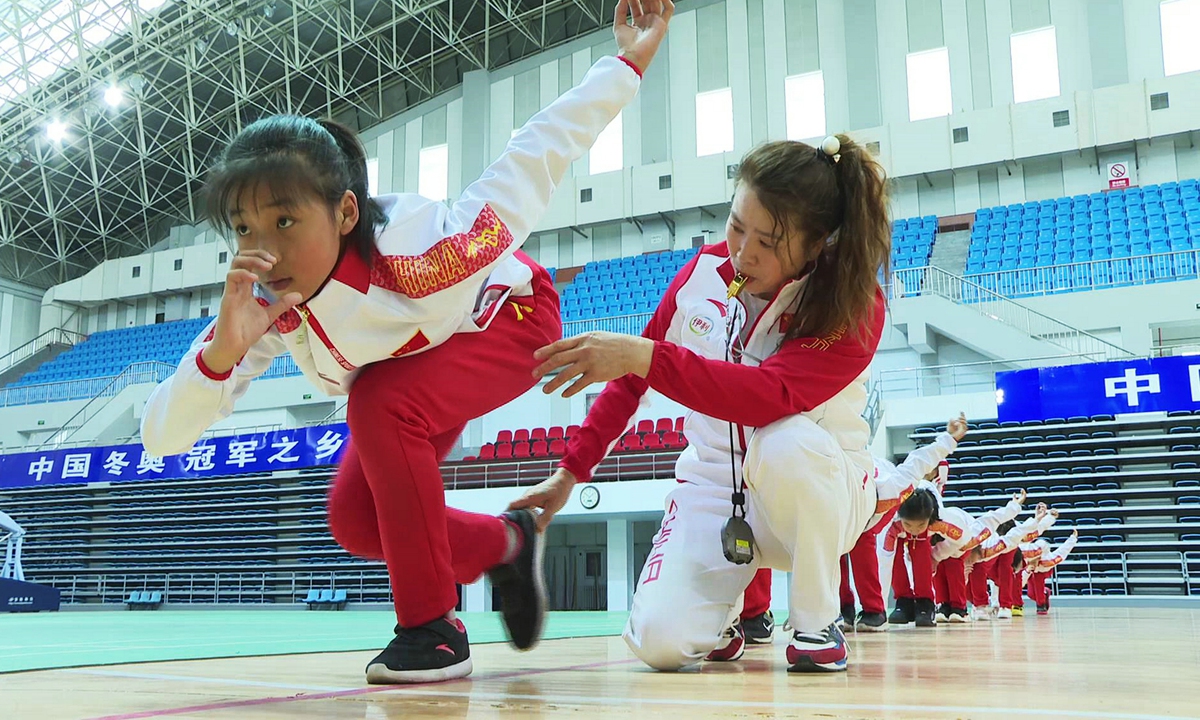
Young trainees practice under the guidance of a coach in Qitaihe on January 21, 2022. Photo:VCG
"A lot of parents asked me how much we would pay for their children's training in Qitaihe. I told them, 'It's all free.' In fact, the Qitaihe government would pay for the children's food, accommodation, and training."Zhang coaches a junior team with 43 athletes, 25 of whom are from other regions. "The farthest are from Guizhou and Gansu." Among the five coaches on Zhang's team are two world champions and one national champion, which is an incomparable luxury for a junior team.
'I'm not going anywhere'
After retiring due to injury, Zhang earned a law degree and went on to study nutrition and rehabilitation for the intellectually disabled in Japan.
In addition to professional youth teams, Zhang also coaches a special team (children with Down syndrome, autism, and intellectual disabilities). Tang Chunlei, who was once assessed as intellectually disabled at 4, trained with Zhang Jie since 2014 and won the men's 500-meter speed skating gold medal at the 2017 World Winter Special Olympics three years later.
Tang was Zhang's initial pride after she relocated to Qitaihe, which some say is due to the healing wonders of love and sports.
Apart from a slight stammer, Tang doesn't look any different from a person living without disabilities. The 24-year-old man is Zhang's teaching assistant and a student at Qitaihe's Vocational and Technical College.
It's hard to imagine that Tang and other special athletes spent three months learning to tie shoelaces and stand on the ice. At that time, Zhang had to hang dolls on his clothes and hair to attract the attention of the children.
Zhang said she has been training with coach Meng for more than 10 years. "At that time, I didn't realize that a coach could have such a huge impact on a child. The reason I am very strict with myself is that I fear my behavior or words might negatively affect the kids' life."
Like other children, the motherless Tang would call Zhang "Mama Zhang." Tang said he learned love and respect from Zhang.
"I think one person can influence a city, even a country. Coach Meng's strength has really supported us for so many years, and I believe it will continue," Zhang said.
In the face of the media, 12-year-old Wang Kaimo is much more restrained. The child from Wuchang county, Harbin, has been training with Zhang in Qitaihe for more than three years. His parents left the city for work and his grandmother took care of him.
Wang Kaimo is the most outstanding child in Zhang's team. "He is almost invincible in his age group and is definitely heading for the national team," Dong said.
The boy told reporters that his hero is coach Zhang. His goal is to become a Winter Olympic champion and a world champion.
But he added that even if one day he receives global recognition, he will return to Qitaihe. "I'm not going anywhere... Qitaihe and the coach cultivated me."

